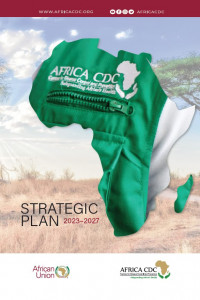

Africa stands at a critical juncture, where the lessons learned from the COVID-19 pandemic as well as Ebola and Monkeypox outbreaks underlined the need for increased self-reliance in our continent’s health systems. There is a shared recognition that Africa can and must do more to safeguard its health security.Established in January 2017 as the specialised technical agency of the African Union, the Africa Centres for Disease Control and Prevention (Africa CDC) has been entrusted with the primary mandate of safeguarding Africa’s health security. Despite facing resource constraints and a limited workforce, Africa CDC has demonstrated the power of regional coordination in responding to public health emergencies. Consequently, Africa CDC was elevated to an autonomous health agency of the Africa Union during the 26th Ordinary Assembly of Heads of State and Government in February 2022, granting it the agility and empowerment to effectively respond to Member States’ needs.Africa CDC has been championing the New Public Health Order calling for a fundamental shift towards an equitable and just public health landscape and ensuring the presence of strong and resilient health systems prior to, during, and after a crisis. The vision is for Africa to take control of its health security through strong local leadership, innovation, and investment in public health infrastructure and systems. As Africa transitions from the acute phase to the recovery phase of the COVID-19 pandemic, it is crucial to recognise the ongoing health threats and increasing occurrence of climate-change related emergencies faced by the continent.To address these challenges, multi-sectoral response mechanisms need to be established, ensuring adaptability, interoperability between Member States, and a One Health approach. This requires innovative approaches in health financing, digitalisation, science and technology, and stronger partnerships with a vision of fostering Africa’s reliance on local resources and homegrown solutions.Looking ahead, Africa’s population is projected to nearly double to 2.5 billion by 2050, accounting for more than 60% of global population growth. The working age population (15-64) is expected to triple, posing both challenges and opportunities. We must ensure that African Member States can provide adequate health care and have agile systems in place to safeguard the health security of this growing younger population. Simultaneously, it also presents an opportunity promising a demographic dividend for economic growth and development.The strategic plan (2023-2027) builds upon the lessons learned and insights gained from implementing the first strategic plan (2017-2021), including organisational assessment and practical lessons derived from successful regional health initiatives on the continent. It reflects a health agenda for Africa anchored on our bold vision of a safe, healthy, and prosperous Africa; supported by a world-class, self-sustaining, and agile Africa CDC, and most importantly driven by empowered African Member States as change drivers.I invite all our national, regional, and global partners to join us as we work towards realising this strategic vision and building the Africa we want.I thank you.H.E Dr. Jean Kaseya Director General, Africa CDC
0 Comments